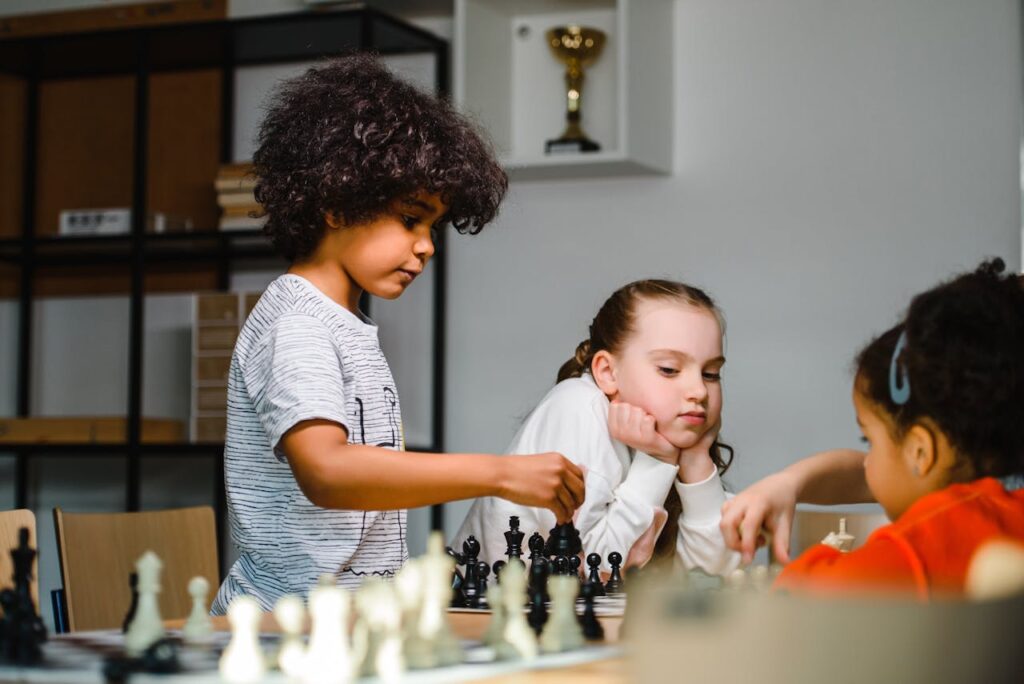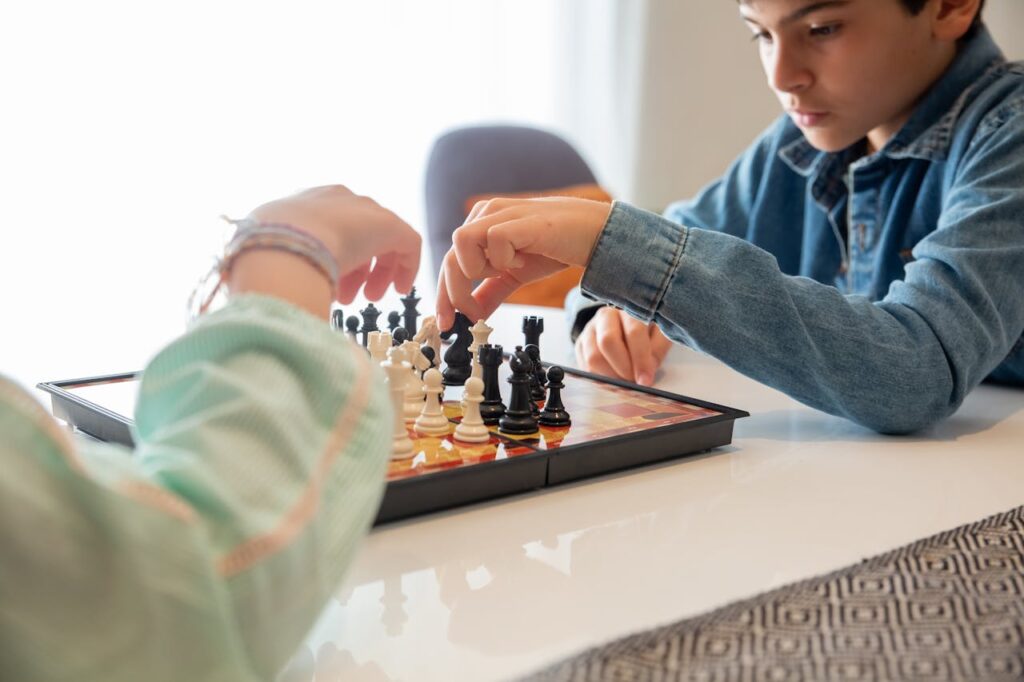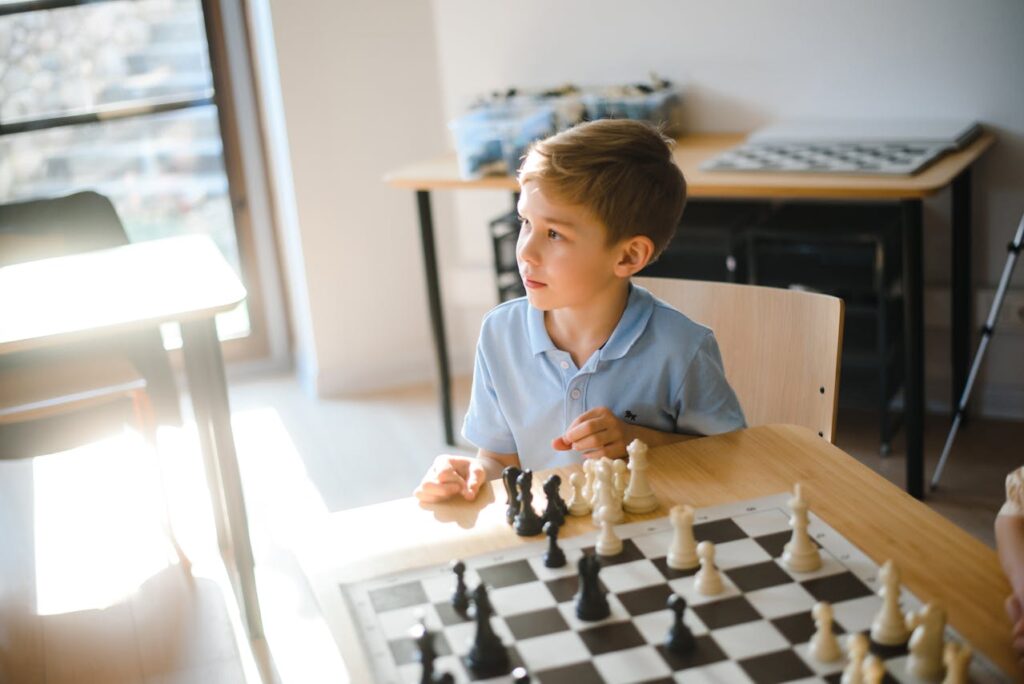Problem-solving is one of the most important skills a child can develop. It’s the ability to face challenges, think critically, and find solutions—skills that are essential for success in school and life. But how do you teach a child to solve problems effectively? One powerful way is through chess.
Chess is much more than a game; it’s a tool that helps children develop strong problem-solving abilities. By playing chess, kids learn to analyze situations, plan ahead, and think creatively, all while having fun. In this article, we’ll explore how chess can become the key to unlocking your child’s problem-solving potential.
How Chess Develops Critical Thinking Skills
Chess is often called the “game of kings,” but it could just as easily be called the “game of thinkers.” Every move in chess requires careful thought and planning.
This process of thinking critically about each move is what makes chess such a powerful tool for developing problem-solving skills in children.
Analyzing the Situation
One of the first steps in problem-solving is understanding the situation at hand. In chess, this means analyzing the current position on the board.
Players need to assess the strengths and weaknesses of both their own pieces and their opponent’s.
They must consider which pieces are vulnerable, which are strong, and what opportunities are available for both attack and defense.
This kind of analysis teaches children to look at problems from all angles. Instead of jumping to conclusions, they learn to gather information and consider all the factors involved.
This skill is incredibly valuable in school, where students often need to analyze information before solving math problems, understanding scientific concepts, or writing essays.
By practicing analysis in chess, children become more adept at breaking down complex problems and finding the best solutions.
Planning Ahead
Once children have analyzed the situation, the next step is to plan ahead. In chess, players must think several moves in advance, considering how their actions will affect the game in the future.
This kind of forward-thinking is crucial in problem-solving, where the ability to anticipate consequences can make the difference between success and failure.
Planning ahead in chess teaches children to think strategically. They learn to consider not just their immediate goals, but also how those goals will impact the overall situation.

For example, a child might decide to sacrifice a pawn to gain a better position later in the game.
This strategic thinking helps them understand that sometimes, solving a problem requires making decisions that benefit them in the long run, even if there’s a short-term cost.
Thinking Creatively
Problem-solving isn’t just about following rules; it’s also about thinking creatively to find new and innovative solutions.
Chess encourages this kind of creative thinking by presenting players with situations where they must come up with unique strategies to succeed.
Unlike many other games, where the best moves are often obvious, chess often requires players to think outside the box.
For example, a child might find themselves in a seemingly hopeless position, with most of their pieces at a disadvantage.
In this situation, they might need to come up with an unconventional strategy, such as using a lesser piece to create a distraction or setting up a trap for their opponent.
This creative problem-solving is a direct result of the challenges posed by chess, where no two games are ever exactly the same.
Building Patience and Persistence
Solving problems isn’t always quick or easy. It often requires patience and persistence, qualities that are essential for success in many areas of life.
Chess teaches children these valuable traits by providing a structured environment where they must focus, think deeply, and stay committed to finding the best solution, even when the game is tough.
Staying Focused
Chess is a game that demands concentration. A single lapse in focus can lead to a mistake that costs the game.
As children play chess, they learn to stay focused on the task at hand, blocking out distractions and keeping their minds sharp.
This ability to concentrate is crucial for problem-solving, where staying focused can make the difference between success and failure.
In school, children are often faced with tasks that require sustained attention, such as studying for a test, completing a challenging assignment, or listening to a complex lesson.
The focus they develop through chess helps them stay engaged with these tasks, making it easier for them to absorb information, follow instructions, and solve problems effectively.
Learning from Mistakes
In chess, mistakes are inevitable. Even the best players lose games and make errors in judgment. However, each mistake is an opportunity to learn and improve.
By reflecting on what went wrong, children can understand their mistakes and think about how they might do better next time. This process of learning from mistakes is a key component of problem-solving.
Mistakes are a natural part of learning, and chess teaches children not to be afraid of them. Instead of seeing mistakes as failures, they learn to view them as valuable lessons.
This mindset encourages persistence, as children understand that every setback is just a step toward becoming better.
Developing Patience
Chess is not a game that rewards rushing. On the contrary, it teaches children the importance of patience.
Players must take their time to consider each move carefully, thinking about the possible outcomes and the best strategy to pursue.
This patience is essential for problem-solving, where quick fixes are often less effective than well-thought-out solutions.
In a world where instant gratification is common, learning to be patient is a valuable skill. Chess helps children develop the ability to wait, to think things through, and to approach problems methodically.
This patience can be incredibly useful in school, where many tasks require careful thought and deliberate action.
For example, when working on a complex math problem, a patient child is more likely to take the time to understand the problem fully before trying to solve it.
They’re less likely to make careless mistakes and more likely to find the correct solution. How Chess Teaches Strategic Thinking
Planning for the Future
In chess, every move matters. Players need to think not only about their current move but also about how that move will affect the game several turns down the line.
This forward-thinking is a crucial part of strategic planning, teaching children to consider the long-term consequences of their decisions.
For example, a child might decide to make a move that, on the surface, seems harmless or even advantageous.
However, if they haven’t thought about how their opponent might respond, they could find themselves in a difficult position a few moves later.
Chess teaches children to think ahead, weighing the potential outcomes of their actions before they commit to a move.
Anticipating Challenges
Another key aspect of strategic thinking is the ability to anticipate challenges. In chess, players must constantly think about what their opponent might do next. This involves considering various possibilities and preparing for different scenarios.
By learning to anticipate their opponent’s moves, children develop the ability to foresee potential problems and plan accordingly.
Anticipating challenges is a crucial problem-solving skill. It helps children prepare for difficulties before they arise, making them more proactive and less reactive.
For example, if a child is working on a science project, they might think ahead about the challenges they could face, such as running out of materials or encountering unexpected results in an experiment.
By anticipating these challenges, they can plan solutions in advance, making the project go more smoothly.
Chess teaches children that being prepared is a key part of success. By considering what could go wrong and thinking about how to handle those situations, they become more resilient and better equipped to solve problems as they arise.

Learning to Adapt
No matter how carefully a plan is made, things don’t always go as expected. In chess, a well-thought-out strategy can be disrupted by an unexpected move from the opponent.
When this happens, players must adapt their strategy and come up with a new plan. This ability to adapt is an essential part of strategic thinking and problem-solving.
Adaptability is the ability to change course when necessary, to adjust plans based on new information, and to stay flexible in the face of challenges.
Chess helps children develop this adaptability by presenting them with situations where they must think on their feet and come up with new strategies on the fly.
For example, if a child’s queen is unexpectedly captured, they may need to rethink their entire approach to the game.
They might decide to focus on a different piece or pursue a different goal. This kind of adaptive thinking is critical in real life, where problems often require quick thinking and the ability to adjust plans based on changing circumstances.
Chess and Decision-Making
Good decision-making is at the heart of effective problem-solving. It involves analyzing options, weighing the pros and cons, and choosing the best course of action.
Chess is a game that requires constant decision-making, as players must choose the best move out of many possible options with each turn.
Evaluating Options
One of the key aspects of decision-making is evaluating options. In chess, every move presents multiple possibilities, each with its own risks and rewards.
Children must carefully consider each option, thinking about how it will affect the game and what the potential outcomes might be.
This process of evaluation teaches children to think critically about their choices.
Instead of making decisions based on impulse, they learn to weigh the pros and cons of each option and choose the one that offers the best chance of success.
This skill is crucial in problem-solving, where making the right decision can often be the difference between success and failure.
Learning to Make Trade-Offs
Chess also teaches children about trade-offs. Sometimes, to achieve a larger goal, players must make sacrifices, such as giving up a piece to gain a better position.
This concept of trade-offs is important in problem-solving, where achieving the best outcome often requires balancing different factors and making compromises.
Understanding trade-offs helps children make more informed decisions.
They learn that they can’t always have everything they want and that sometimes, they need to give up something in the short term to gain something more valuable in the long term.
This understanding is essential for making decisions that lead to successful problem-solving.
Developing Confidence in Decision-Making
Decision-making can be challenging, especially for children who are still learning to trust their judgment.
Chess helps build this confidence by giving children regular opportunities to make decisions and see the outcomes of those decisions.
As they play more games and see the results of their choices, they become more confident in their ability to make good decisions.
This growing confidence is essential for problem-solving. When children trust their decision-making skills, they’re more likely to take initiative, tackle challenges, and find solutions on their own.
They learn that even if a decision doesn’t lead to the desired outcome, it’s still an opportunity to learn and improve.
Chess as a Tool for Developing Patience and Perseverance
Patience and perseverance are vital components of problem-solving. They allow children to stay focused on long-term goals, work through challenges, and keep trying even when the path is difficult.
Chess naturally cultivates these traits, as the game often requires players to endure lengthy, complex battles where victory is far from guaranteed.
Embracing the Long Game
Chess is a game of endurance. Unlike many other activities that offer immediate results, chess requires players to think long-term.
A single game can take hours, and success often depends on a player’s ability to maintain focus and patience throughout.
This emphasis on the “long game” teaches children that some goals take time to achieve and that persistence is key.
In life, many problems cannot be solved instantly. Whether it’s mastering a new subject, improving a skill, or working towards a personal goal, patience is often required.
Chess teaches children that success is not always immediate and that they must be willing to invest time and effort to achieve their objectives.
For instance, in school, children might face projects or subjects that take weeks or even months to complete.
By embracing the patience and perseverance learned from chess, they can approach these long-term tasks with the understanding that steady progress is more important than instant results.
Handling Setbacks with Grace
Setbacks are an inevitable part of chess—and life. Even the best-laid plans can be disrupted by an opponent’s unexpected move, and players must learn to recover from these setbacks without losing their composure.
Chess teaches children to handle setbacks with grace, helping them understand that obstacles are not the end of the road but simply part of the journey.
When faced with a setback in chess, players must reassess their position, rethink their strategy, and continue playing.
This ability to recover from setbacks and keep going is a valuable problem-solving skill. It teaches children that challenges are a normal part of any endeavor and that the key to success is not avoiding difficulties, but overcoming them.
In school, children might encounter setbacks such as poor grades, difficult assignments, or conflicts with peers.
By applying the lessons learned in chess, they can approach these challenges with resilience and determination.
They learn that setbacks are opportunities to learn and grow, rather than reasons to give up.
The Reward of Persistence
One of the most rewarding aspects of chess is the satisfaction that comes from seeing a plan through to completion.
Whether it’s successfully executing a strategy or finally achieving checkmate after a long battle, the rewards of persistence are clear in chess.
This sense of accomplishment reinforces the value of sticking with a problem until it is solved.
Persistence is a crucial aspect of problem-solving. Many challenges require sustained effort and a willingness to keep working even when progress is slow.
Chess helps children develop this persistence by providing a clear connection between effort and reward. They learn that the most satisfying victories are often those that require the most persistence.
This lesson is particularly important in school, where many tasks require ongoing effort over time.
Whether it’s studying for a final exam, writing a research paper, or practicing a new skill, persistence is often the key to success.
Chess and Emotional Intelligence
While chess is often seen as a purely intellectual game, it also plays a significant role in developing emotional intelligence.
Emotional intelligence—the ability to understand and manage one’s emotions as well as empathize with others—is a critical factor in effective problem-solving.
Managing Emotions
Chess can be an emotional game. The highs of victory and the lows of defeat are part of the experience, and children must learn to manage these emotions effectively.
Chess teaches children to stay calm under pressure, to control their excitement when things are going well, and to keep their composure when facing setbacks.
Managing emotions is essential for problem-solving. When emotions run high, it’s easy to make impulsive decisions or become discouraged.
Chess helps children develop the emotional regulation skills needed to stay focused and think clearly, even in challenging situations.
They learn to approach problems with a calm and steady mindset, which is crucial for finding effective solutions.

For example, during a tough game of chess, a child might feel frustrated if their strategy isn’t working as planned.
However, instead of giving in to frustration, they learn to take a deep breath, reassess the situation, and adjust their approach.
Developing Empathy
Chess is a game of strategy, but it’s also a game of understanding your opponent. To play effectively, children must think about what their opponent is likely to do, which requires a level of empathy.
They need to put themselves in their opponent’s shoes, anticipating their moves and understanding their strategy.
This practice of empathy in chess helps children develop a deeper understanding of others. They learn to consider different perspectives and to think about how their actions will affect others.
This skill is crucial in problem-solving, where understanding the needs and viewpoints of others can lead to more effective and harmonious solutions.
In real life, empathy helps children navigate social situations, work effectively in groups, and resolve conflicts.
By developing empathy through chess, children become better communicators and collaborators, which enhances their ability to solve problems in a way that benefits everyone involved.
Building Resilience
Resilience is the ability to bounce back from setbacks and continue moving forward. In chess, as in life, things don’t always go as planned.
A player might lose a crucial piece or fall behind in the game, but the ability to recover and keep playing is what makes a great chess player—and a great problem solver.
Chess teaches children that resilience is about more than just winning or losing. It’s about staying in the game, learning from each experience, and continuing to improve.
This resilience is essential for problem-solving, as it helps children stay focused and motivated, even when the going gets tough.
For instance, a child who loses a game of chess might initially feel disappointed. However, by reflecting on the game, learning from their mistakes, and trying again, they build resilience.
This resilience helps them approach challenges in school and life with a positive attitude, knowing that setbacks are temporary and that persistence will lead to success.
How Chess Prepares Kids for Real-World Challenges
The problem-solving skills developed through chess are not just applicable to the game itself—they’re valuable tools for navigating the real world.
Whether in academics, relationships, or future careers, the lessons learned through chess prepare children to face life’s challenges with confidence and skill.
Enhancing Academic Performance
The critical thinking, strategic planning, and persistence developed through chess translate directly into improved academic performance.
Children who play chess regularly often find that they’re better equipped to handle complex subjects, manage their time effectively, and approach their studies with a problem-solving mindset.
For example, in subjects like math and science, where logic and analysis are key, the skills developed in chess can give children a significant advantage.
They learn to approach problems methodically, break down complex concepts, and find solutions through careful thought and planning.
This analytical approach helps them excel in their studies and achieve better grades.
In language arts, the creative thinking and empathy fostered by chess can enhance children’s ability to understand literature, craft compelling arguments, and communicate their ideas effectively.
Chess teaches them to see multiple perspectives and to express their thoughts clearly, which are crucial skills for success in writing and discussions.
Preparing for Future Careers
The problem-solving skills honed through chess are also highly valued in the workplace. Many careers require the ability to think critically, plan strategically, and adapt to changing circumstances—all skills that are central to chess.
By learning these skills at a young age, children are better prepared for the challenges they will face in their future careers.
For example, in fields like engineering, technology, business, and medicine, the ability to analyze complex problems, anticipate challenges, and develop innovative solutions is essential.
Chess provides a foundation for these skills, helping children develop the mindset needed to succeed in demanding professional environments.
Moreover, the resilience, patience, and emotional intelligence developed through chess are valuable assets in any career.
These qualities help individuals navigate workplace challenges, work effectively in teams, and maintain a positive and proactive approach to their work.
Building Strong Relationships
Problem-solving is not just about tackling academic or professional challenges—it’s also about building and maintaining strong relationships.
The empathy, communication skills, and emotional intelligence developed through chess help children become better friends, teammates, and leaders.
Chess teaches children the importance of understanding others, working together, and approaching conflicts with a problem-solving mindset.
These skills are essential for building healthy and supportive relationships, both in school and in life.
By learning to see things from others’ perspectives and to communicate effectively, children are better equipped to resolve conflicts, collaborate on projects, and support their peers.
In leadership roles, the strategic thinking and decision-making skills developed through chess can help children guide others effectively, set clear goals, and navigate challenges with confidence.
Whether in school clubs, sports teams, or future careers, these leadership qualities are invaluable for achieving success and making a positive impact on others.
Conclusion
Chess is far more than just a game—it’s a powerful tool for developing the problem-solving skills that children need to succeed in life.
Through chess, kids learn to think critically, plan strategically, adapt to challenges, and approach problems with patience and perseverance.
They also develop emotional intelligence, empathy, and resilience, which are essential for building strong relationships and navigating life’s challenges.
By introducing your child to chess, you’re giving them the opportunity to develop these crucial skills in a fun and engaging way.
Whether they become passionate chess players or simply enjoy the occasional game, the lessons they learn through chess will stay with them for life, helping them tackle challenges with confidence and creativity.
At the Global School of Chess, we’re dedicated to helping children unlock their full potential through the game of chess.

